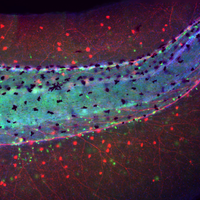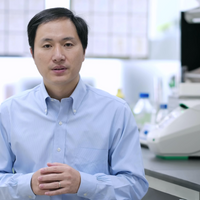embryo

The First Two Cells in a Human Embryo Contribute Disproportionately to Fetal Development
Shelby Bradford, PhD | May 13, 2024 | 4 min read
A research team showed that, contrary to current models, one early embryonic cell dominates lineages that will become the fetus.

Mouse Embryo: No Sperm, Egg, or Uterus Required
Christie Wilcox, PhD | Aug 2, 2022 | 3 min read
Using stem cells and a bioreactor, researchers generated living embryos that survived for more than a week and began to develop internal organs.

How Wandering Nuclei Shape Developing Embryos
Viviane Callier | Jul 29, 2022 | 3 min read
As cricket blastoderms form, cell nuclei are pulled into an egg’s remaining empty space to form the new cell layers that will shape the developing animal.

Opinion: The Reproductive Technology Advances No One Asked For
John D. Loike and Alan Kadish | Jun 22, 2022 | 4 min read
Cloning and parthenogenesis of humans wouldn’t align with bioethical principles.

Cancer Researcher Beatrice Mintz Dies at 100
Natalia Mesa, PhD | Jan 20, 2022 | 2 min read
Mintz’s experiments over her six-decade career were foundational to cancer and genetics research.

Mammalian Embryos Might Not Need Primitive Streaks After All
Dan Robitzski | Dec 2, 2021 | 7 min read
The primitive streak, a structure that emerges during mammalian and avian gastrulation, might be a byproduct rather than a landmark of the embryonic development process.

Infographic: Animal Embryos Coopt Sound to Survive and Thrive
Amanda Heidt | Nov 1, 2021 | 1 min read
Across the tree of life, animals use sound and other vibrations to glean valuable sensory information about their environments even before they are born.

Slideshow: How Animal Embryos Eavesdrop on the Outside World
Amanda Heidt | Nov 1, 2021 | 4 min read
Watch and listen to reptiles, amphibians, insects, and birds respond to sound from inside their eggs.

How to Grow a Mouse Embryo in a Dish
Roni Dengler, PhD | Aug 3, 2021 | 3 min read
Researchers are taking the concept of three-dimensional cell culture beyond single organoids to develop embryos from cells.

Study that Impregnated Male Rats Stirs Controversy
Andy Tay | Jun 25, 2021 | 7 min read
A combination of approaches, including uterus transplantation and the joining of two animals’ circulatory systems, allowed males to bear pups, according to a preprint. But some experts say the experiments were not justified.

High Profile Developmental Biologist Lewis Wolpert Dies at 91
Shawna Williams | Feb 16, 2021 | 2 min read
Wolpert, who conducted research at University College London, was known for his work on morphogenesis and pattern development in embryos and for his multiple books and broadcast appearances.

Panel Lays Out Guidelines for CRISPR-Edited Human Embryos
Lisa Winter | Sep 4, 2020 | 2 min read
The International Commission on the Clinical Use of Human Germline Genome Editing claims the technology is still too risky for therapeutic use.

Image of the Day: Brainless Frogs
Amy Schleunes | Feb 18, 2020 | 1 min read
Without a brain, the frog embryo immune system doesn’t receive the signals it needs to mobilize macrophages and fight infections.

A Woman of Firsts, Early 20th Century
Emily Makowski | Jan 13, 2020 | 3 min read
Florence Sabin was known for her pioneering research and efforts to support women in science.

China Sentences Gene-Editing Scientist to Three Years in Jail
Emily Makowski | Dec 30, 2019 | 2 min read
The modification of three babies’ genes by He Jiankui drew widespread criticism from scientists.

Photos of the Year
Emily Makowski | Dec 26, 2019 | 2 min read
From bubbling plants to endangered whales, here are some amazing images from The Scientist in 2019.

Early Embryo Models Generated from Mouse Stem Cells
Abby Olena, PhD | Oct 17, 2019 | 4 min read
Extended pluripotent stem cells from mice can self-organize to form blastocyst-like structures called blastoids that enable a closer look at early mammalian development.

First Human–Monkey Chimeras Developed in China
Nicoletta Lanese | Aug 5, 2019 | 3 min read
The researchers aim to grow transplantable human organs from primate embryos.

Turtle Embryos May Have a Say in Deciding Their Sex
Katarina Zimmer | Aug 1, 2019 | 4 min read
In a species of freshwater turtle, embryos can move toward warmer or cooler environments within the egg and thus help choose their sexual destiny, but not all experts are convinced.
